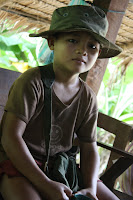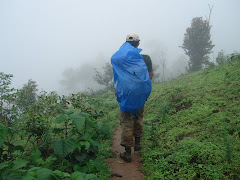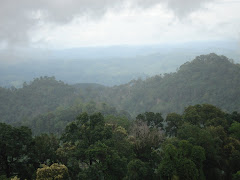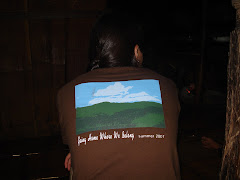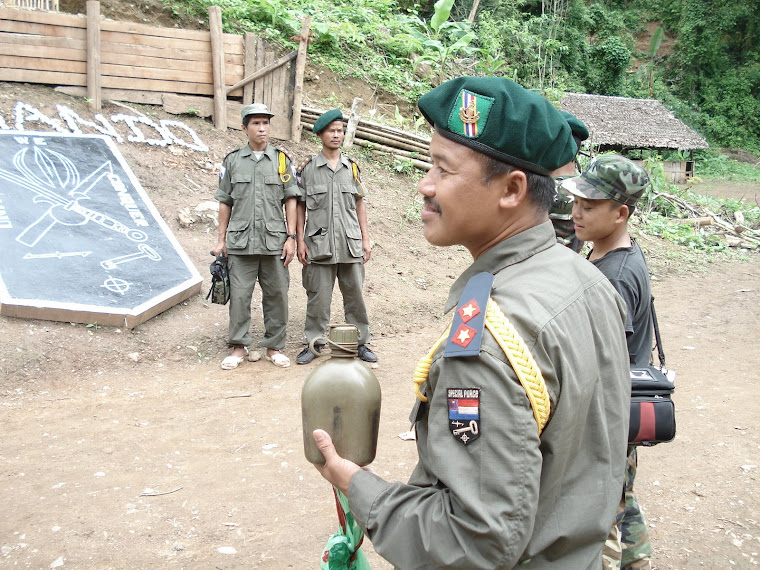
(September 6 – October 3, 2010)
A Karen Soldier’s Thoughts (in conjunction with mine)
He is the functional equivalent of a drill-sergeant. He trains the enlisters during their first four months of basic training in the Karen National Liberation Army (KNLA). He is in his early thirties, maybe. With a soft smile on his face he wears, he carries a small green army bag across his shoulder all the time. And, he smokes when he comes back to his barrack to take a break. He can be seen half laying and half sitting, leaning against the bamboo wall or a pile of rice-sacks at the corner in the barrack. Other times, he can be seen around the training ground, with the soldiers.
I was on the military compound to teach at the nearby Officers’ Training School. Since the compound is an all-male-club, there were no female accommodations. So, when we arrived, myself and another female friend, they first built a separate a new bathroom for us. They emptied the instructors’ barracks to house us. And, during my stay there, another female – an old friend – arrived, intruded. Then, there were three of us.
To reach the school where I taught, we have to traverse the training ground. Initially, it served as a stage for our intrusion – as we walked across it, we stuck out more brilliantly than we did when hiding in our new accommodations. They, in their dark uniforms; me, in my brightly-hued longyi.
Every morning, as I walked to the school, I was reminded of one of the cases I read in law school – the Virginia Military Institute case. Not because I felt any discrimination; on the contrary, I could not have felt more welcome. But because there were something missing: the presence of women attending such an important training school. As I made the trek to class, I pondered the absence of women: why were there no women? Do we need women to participate in this particular field of the struggle?
On evening, one of my female friends returned from her walk of the compound and shared an exchange she had overheard on the training ground. A senior soldier – the functional equivalent of a drill sergeant chastised a soldier, he said: “Don’t be like a woman.” It was a simple statement.
As usual, I did not contain my thoughts. I shared them with the Brigadier General. I understood it was a casual statement; but it was a thoughtless statement. The speaker did not think about what he was saying. And, to me, that was a problem. Why didn’t he think? Shouldn’t he think? What happens if he thinks? If he did not think before, shall he begin to think now?
On my last day, both of my friends left before me in the morning and I stayed behind to conclude my last class. When I came back from my class during lunch break (the lunch break was for me, because the soldiers and all the cadets had only two meals a day), there in the living room I saw the ‘drill-sergeant’ and a couple other soldiers relaxing. As usual, they were smoking cigars and talking quietly about many things.
As I finished eating, I overheard the drill sergeant talking to himself.
“It must be a lot easier to govern the country with peace than with war. Don’t you think, Tharamu [Teacher]?”
He made a statement to himself and at the end asked for my opinion, seemingly without expecting me to answer. And, he continued:
“It’s just a click if the military regime wants to rule peacefully. That way I wouldn’t have to fight either, and none of these men I am training would have to fight. I wonder what we would be doing if we did not have to fight.”
I turned back to look at him and saw that he was reading an old piece of a newspaper. I did not know what he was reading about exactly. He went silent for a while and then said:
“I’ve got enough of war. But, these Burmese troops occupying our land here must know that I get up every morning to train more soldiers like me. We will fight until fighting becomes unnecessary.”
I looked at him again. He was lying there, calmly, in his usual posture. No sign of anger or hatred in his look, nor in his tone. I got up and got ready to go back to my class as it was about time. I told him to have a good day and I left off.
On the way, listening to my footsteps, I thought what I might say to the cadets. Under my boots, there laid the ground – a red earth – for all of us. The ground did not complain about how many footsteps it had to accommodate.
As for my last conversation with the cadets at the Officers’ Training School, of all the things that I wanted to tell them, I chose 3 points to ensure they would not forget:
1) They are the precious sons of the Karen people who are trained to become the leaders of next generation and who will have to lead the country to peace and prosperity for all;
2) They must be individuals and leaders who think rationally, who are sympathetic to the weak and the suffering, who stand up against whomever or whatever in defense of justice for all; and
3) They must be individuals and leaders who treat each other as well as all other people with respect regardless of gender, ethnicity, and faith or religion.
And, of course, I wanted them to know that I love them very much simply because of their selfless sacrifice for something that they believe in – peace and justice for our people. The common good for which they brave the world’s ruthless regime, we are going to forever be indebted.
May Oo
xxx

